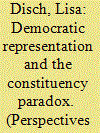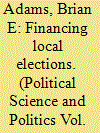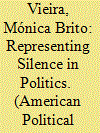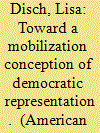| Srl | Item |
| 1 |
ID:
116442


|
|
|
|
|
| Publication |
2012.
|
| Summary/Abstract |
That acts of democratic representation participate in creating the interests for which legislators and other officials purport merely to stand gives rise to the "constituency paradox." I elucidate this paradox through a critical reading of Hanna Pitkin's The Concept of Representation, together with her classic study of the philosopher Ludwig Wittgenstein, Wittgenstein and Justice. Pitkin's core insight into democratic representation is that democratic representation is "quasi-performative": an activity that mobilizes constituencies by the interests it claims in their name. I develop this insight together with its implications for contemporary scholarship on the political effects of economic equality. I conclude by arguing that the fundamental democratic deficiency of the US political system goes much deeper than its disproportionate responsiveness to wealthy interests; it is a matter of system biases that foster the formation and expression of those interests, while mitigating against mobilization by those Americans who want inequality to be reduced.
|
|
|
|
|
|
|
|
|
|
|
|
|
|
|
|
| 2 |
ID:
102083


|
|
|
| 3 |
ID:
175273


|
|
|
|
|
| Summary/Abstract |
Democratic representation focuses on voice: it conceives voice as that which is represented and as the prime mode of representing. This article argues that this focus is problematic and turns instead to silence to ask a fundamental question: Can representation empower citizens from their silent positions? I approach the question in three parts. First, I offer a new conceptualization of silence, arguing that silence is best understood as the site of a potential or actual presence. Second, I use criteria of domination and displaced involvement to assess attempts to enfranchise silence within the transmission-belt model of representation. Third, I critically engage and strengthen constructivist views of representation by developing these criteria to assess the legitimacy of claims to represent—speak about and for—silent constituencies—namely, the claim to represent an (alleged) silent majority.
|
|
|
|
|
|
|
|
|
|
|
|
|
|
|
|
| 4 |
ID:
105172


|
|
|
|
|
| Publication |
2011.
|
| Summary/Abstract |
This article analyzes what I term "the dilemma of democratic competence," which emerges when researchers find their expectations regarding democratic responsiveness to be in conflict with their findings regarding the context dependency of individual preferences. I attribute this dilemma to scholars' normative expectations, rather than to deficiencies of mass democratic politics. I propose a mobilization conception of political representation and develop a systemic understanding of reflexivity as the measure of its legitimacy. This article thus contributes to the emergent normative argument that political representation is intrinsic to democratic government, and links that claim to empirical research on political preference formation.
|
|
|
|
|
|
|
|
|
|
|
|
|
|
|
|
| 5 |
ID:
163816


|
|
|
|
|
| Summary/Abstract |
In this article I attempt an ethnography of democratic representation in India by examining how ordinary villagers in the north-eastern state of Nagaland relate to their politicians, what they expect of them, and what yardsticks they adopt to evaluate their performance in office. I focus on the dialectical relationship between homegrown Naga political theory and praxis, and the specificities of Nagaland state and governance to show that the form democratic representation takes there is a reflection of historical particularities and the society’s own conception and normative imagination of its political self and sociality. Provincialising liberalist projections of democratic representation, the article contributes to a promising body of creative analysis that is paving the way for a much fuller and richer understanding of existing democratic life-worlds in South Asia.
|
|
|
|
|
|
|
|
|
|
|
|
|
|
|
|